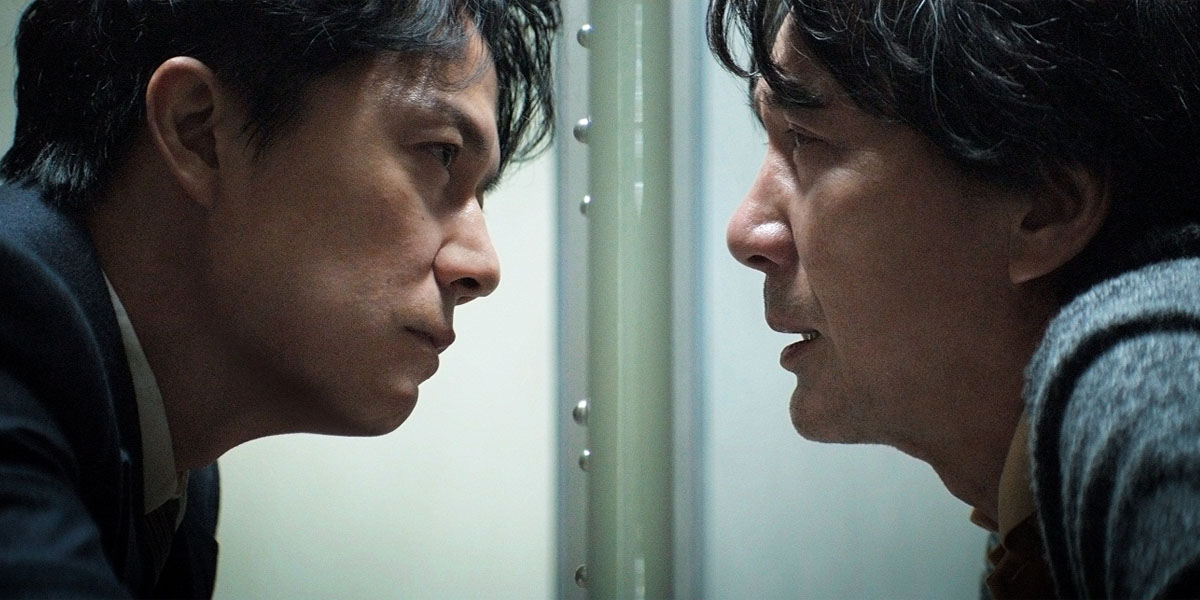The greatest of Japanese filmmakers have a chameleonic quality. Although these directors—Akira Kurosawa, for example—build their reputation around one genre (jidai-geki, or the Shogunate period epic, in the case of Kurosawa), they export their thematic preoccupations to projects that couldn’t be more disparate in terms of subject matter. Hirokazu Kore-eda is one such modern master, whose soft-spoken family dramas are broken up by more unorthodox projects, like magical-realist efforts “After Life” and “Air Doll,” or “Hana,” a jidai-geki in the tradition of Kurosawa, albeit with an identifiable Kore-eda touch. His latest aberration is a procedural, “The Third Murder,” opening in U.S. arthouse theaters courtesy of Film Movement.
In most circumstances, it would be erroneous to cite legal thriller “The Third Murder”—kicking off its festival run in the Main Competition of the Venice Film Festival last year—Kore-eda’s ‘latest’ film. The Japanese director works at such a steady clip that this procedural detour has already been superseded by “Shoplifters,” a more on-brand feature that snagged the filmmaker the coveted Palme d’Or at the Cannes Film Festival in May. “The Third Murder” functions well as a topical genre detour for the acclaimed director, but a degree of incongruity between the demands of the procedural formula and Kore-eda’s usual languid pacing keep the film from reaching the upper echelons of his greatest work.
“The Third Murder” opens with a strong thriller hook: it’s nighttime on the waterfront when Misumi (Koji Yakusho) kills a man in cold blood and sets fire to his corpse. Shigemori (Masaharu Fukuyama) is his lawyer, tasked with keeping Misumi from receiving the death penalty, a defense which hinges not on the fact that the murder occurred but the circumstances surrounding it. The case forces Shigemori to confront his own upbringing in the northern region of Hokkaido, where his father—an esteemed judge—once let Misumi off for the murder of two other men. As more facts emerge, it becomes clear that Kore-eda is more interested in the illusion of objective truth than providing a pat resolution to the central mystery.
Koji Yakusho does well to lean into the enigmatic persona that characterizes his J-horror collaborations with Kiyoshi Kurosawa (“Cure,” “Pulse,” “Charisma”). Misumi’s account of the night of the murder is constantly shifting and to an unclear end, with what seems like a foolish lack of regard for his own well-being. It’s implied that, like with Yakusho’s Kurosawa protagonists, the character is a kind of void; his acts of violence are in service of a greater justice and transgress the order of Japanese society. Likewise, that same veil of propriety keeps him from betraying the secrets of murder victim’s family, or even acting out of self-interest. Fukuyama delivers a restrained performance as the defense attorney. Most impressively, the actor seems to have shaken off some of the pop idol gloss that coated his lead role in Kore-eda’s “Like Father, Like Son,” yet remains green enough to convey a young, naive lawyer who is clearly out of his depth.
A virtuosic sequence towards the end of the film—certainly among the most stylistically adventurous passages Kore-eda has accomplished in his career—is unquestionably a tip of the hat to the climactic scene of one of Kurosawa’s modern-setting masterpieces, “High and Low.” This ultimate encounter between Misumi and his lawyer is both artful and practical in its response to the challenge of keeping the numerous meetings across prison glass from becoming staid and repetitive. Kore-eda traces an arc with his protagonists, at times placed at opposite ends of the screen in profile and otherwise the respondent is glimpsed in reflection as the primary speaker is framed in close-up. This visual trajectory speaks to Shigemori’s tempestuous identification and confusion with his client with whom he is bound by the legal system.
If the measure of success for a Hirokazu Kore-eda film is how firmly and unshakeable its grip on the viewer’s heart is, “The Third Murder” ranks lower in his canon. The film moves somewhat slow for its genre (but par for Kore-eda) in part due to Misumi’s shifting recollections, and his mutability keeps the character from being all that sympathetic. With that said, there is nonetheless a great deal of merit to this procedural thriller, particularly as pertains to its timeliness. Parallel to “The Third Murder” approaching its U.S. theatrical release, Japan’s capital punishment laws made international news with the execution of the cult leader and others responsible for the 1995 Sarin gas attacks in Tokyo. The connection between this horrific event and “The Third Murder” isn’t all that tangential; Kore-eda already took up the personal trauma generated by the incident as a subject for 2001’s “Distance.” As the culprits of this notorious crime finally reach their fate—over 20 years later—“The Third Murder” reminds us that the death sentence cannot hope to offer the satisfaction that its brutal finality suggests. [B]





